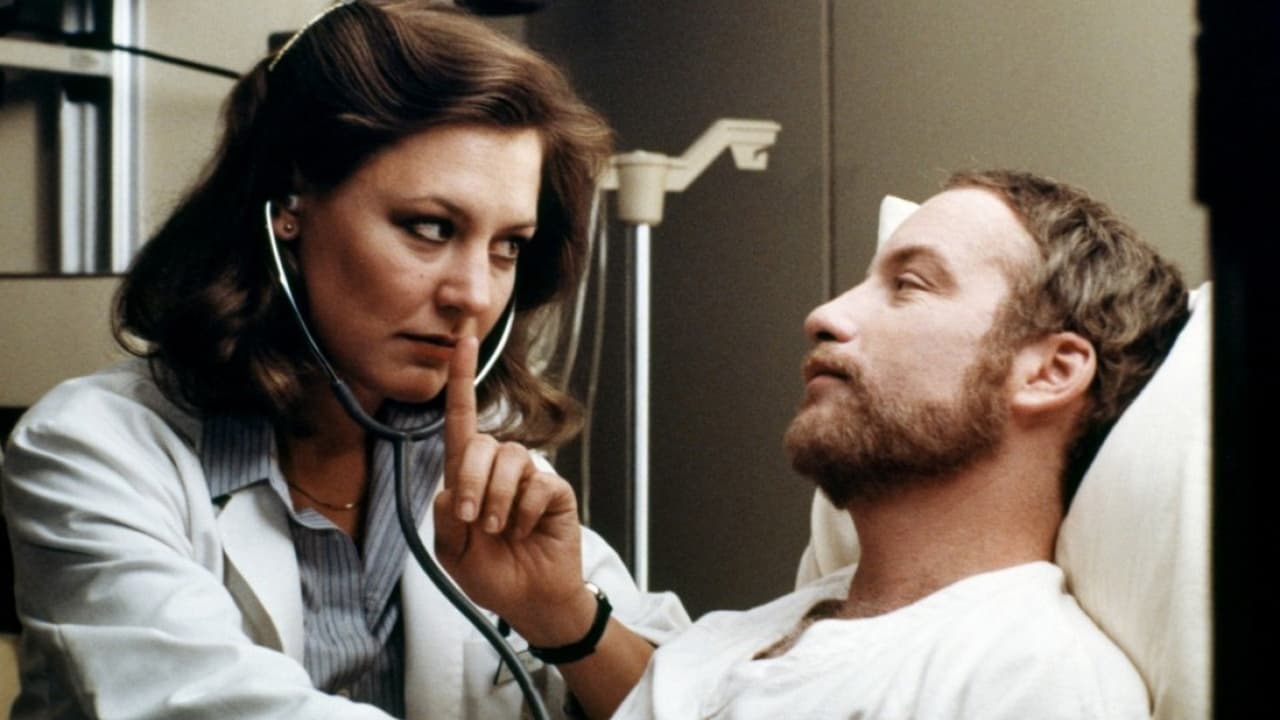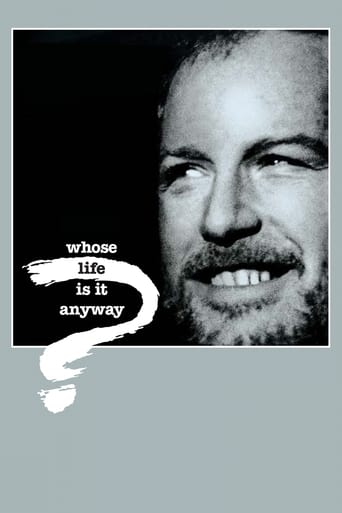Ketrivie
It isn't all that great, actually. Really cheesy and very predicable of how certain scenes are gonna turn play out. However, I guess that's the charm of it all, because I would consider this one of my guilty pleasures.
Derry Herrera
Not sure how, but this is easily one of the best movies all summer. Multiple levels of funny, never takes itself seriously, super colorful, and creative.
KissEnglishPasto
.........................................................from Pasto,Colombia...Via: L.A. CA., CALI, COLOMBIA and ORLANDO, FL Events in your life can shape and change you...sometimes radically. Before my heart attack and triple bypass I rated this 8*. Now, it is a most resounding 10*! In "Whose Life" the life-altering event for sculptor Ken Harrison (Richard Dreyfuss in an outstanding performance) was a traffic accident that left him quadriplegic.About 6 months after the fact, Harrison begins to to realize that not only his sculptures, but his perception of the world, its interpretation and his own self-image had been shaped through the use of his hands. Of course, his hands "died" on the day of the accident, and therefore, Harrison concludes, so did he.The film focuses on both his day to day struggle to cope with his unbearable condition and his confrontation with the hospital administration, or at least with its decision-making chief medical officer, Dr. Emerson (John Cassavetes-turning in a fine performance), who is intent on keeping Harrison in the hospital and under its care, against his will, even if that means declaring Harrison incompetent.Christine Lahti also has a supporting role. The film is highly effective but not pretentious or preachy in the least. 10* STARS*.....ENJOY/DISFRUTELA! Any comments, questions or observations, in English or Español, are most welcome!
James Hitchcock
Ken Harrison, a young sculptor in his early thirties, is seriously injured in a road accident. End of story."End of story", that is, in the sense of "end of any physical action". Not in the sense of "end of the film". Ken's life is saved, but he is paralysed from the neck down. When he discovers that he is unlikely ever to regain the use of his limbs he decides that he wants to die and asks the doctors to end the medical treatment which is keeping him alive. The rest of the film is essentially one long debate about the rights and wrongs of euthanasia and the right to die.Ken's main antagonist in this debate is his doctor, Michael Emerson. Although the case against euthanasia is often presented in religious terms, here it is presented in purely secular ones. If Dr Emerson has any deep religious convictions, these are never expressed in the film. He believes passionately, however, that death is an enemy against which it is his duty as a doctor to fight; to allow a patient effectively to take his own life would represent a surrender to that enemy and a dereliction of that duty. Ken therefore finds himself in a "Catch-22" situation. He must be able to show that he is sane and rational enough to make the decision to end his life. Emerson, however, considers that a wish to die is in itself evidence of insanity and irrationality. Ken's dilemma can only be solved by hiring a lawyer to sue the hospital.Richard Dreyfuss as Ken and John Cassavetes as Dr Emerson put across their respective points of view skilfully and with sincerity, but this cannot hide the fact that "Whose Life is it Anyway?" simply does not work as a film. At one time filmed versions of stage plays were done in a similar way to theatrical productions but by the seventies and eighties this was often seen as unsatisfactory because of the differences between the two media. When plays were filmed, therefore, the general tendency was to "open them up" by filming on location as well as on studio sets, by taking liberties with the playwright's text, often making significant changes to the plot and even introducing extra characters.I have never seen Brian Clarke's play, but I suspect that this is a story that would work better in the theatre than in the cinema. There is very little physical action; most of the action consists of lengthy discussions around a hospital bed in which the main character lies paralysed. Such a plot does not lend itself to the "opening up" device at all, and the resulting film is very static, dominated by talk at the expense of action. Although it is well written and there is some good acting, I am surprised that a film was ever made of such an uncinematic subject. 4/10
tributarystu
Sane people can have the desire to die, it's an indisputable fact. In arguing why, "Whose Life Is It Anyway?" tries to balance a dispute so personal, that it seems bound to fail. And yet, it does not! The story features a sculptor who is left paralyzed after a wrecking car accident and ends up in a most undesirable situation. His status renders him incapable of being the person he once was and found in the impossibility to reconcile his former self with his current condition, Ken Harrison decides to die.His quest is, most obviously, a difficult one. The doctors do not support him in his decision and in this debate - doctor::patient - it is where the film conjures the most solid arguments in its plea. Going beyond the usual ethical components of this choice, the film manages to assert a very personal position to the main protagonist, which therefore makes the whole experience one of anguish on a very personal level. And this is where it makes its point: there is no universal justification for death and the world has no right to interfere in the sphere of anyone's consciousness. Perhaps it is at times overly dramatic and it treats the subject with tantalizing care, but in the end, I felt the film balanced all the facts concerned in a convincing and compelling way, vividly portraying the painful demise of a strong mind in face of the cruelty of destiny. It might seem to take a stance on every man's right to choose his fate, but in the matter at hand (whether death by will is right or wrong) it emits no absolute messages.Beyond everything, Richard Dreyfuss sustains an authentic feeling of intellectual pain, in his convincing performance. And it is only in pain and suffering that we can look into ourselves to understand how much we are willing to bear in this world and what makes us be. Suicide I do not believe a solution, but then again, I am on the other side of the river, where things seem filthy green, rather than nothing at all. We are so alone in death and pain, that nobody can truly claim to understand us.
regysearcher
i remember running into this film several times on TV but i've never actually watched it entirely until now. the movie is a very convincing plead for death. a man who argues with himself because nobody around him knows how to listen. very smart lines, a genuine Richard Dreyfuss, very intelligent (though sometimes dark) humor. i won't tell you more not to spoil the fun. a similar story (which now i think this movie inspired) you'll find in Alejandro amenabar's "mar adentro".since you find a lot of hollywoodian crap movies "flagged" 7.7 like "lucky number slevin" for example (which i think is a f...g aberation - who votes for these anyway? 4 votes at most not to consider the acting which is a total failure) i'd give this an 8 out of 10.it'll get you questioning about human reactions in desperate cases. i dearly recommend it to whoever hesitates seeing it and runs into this comment.

